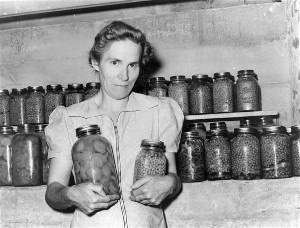This week marks the centennial of the Smith-Lever Act that brought great delight to farm women around the country for many years. The Act, signed by President Woodrow Wilson on May 8, 1914, created financing for Home Demonstration Clubs, which really meant the hiring of a Home Demonstration Agent and providing her with a car in rural America.
Home Demonstration Work, a part of Extension Service work in Texas, began in Hunt County in an organized manner in 1922 when Mamie Lee Haden came to Greenville as the first Home Demonstration Agent. She helped rural women organize their clubs. One of the first was the Jacobia Home Demonstration Club.
According to an interview with Mrs. C. E. Girdner in 1950, at the first club meeting the ladies learned how to can green beans using a pressure canner. The canner was a large contraption that held a large number of tin cans. The cans had to be sealed with a soldering iron after putting the vegetables in the cans. That first day the women canned beans until midnight. Many of the neighbors came to the canning center set up in a shed away from the house to learn how to use this piece of equipment. Later the canner was circulated around among the members for individual use.
By 1950 Hunt County had thirty-four Home Demonstration Clubs with an enrollment of over 600 women. They met four times a year with the Home Demonstration Agent and the other twenty times local members taught a new skill learned from special classes given by the Agent. Lessons included everything from gardening to health and hygiene, with one demonstration showing how to build an outdoor privy. Sewing and simple interior decoration were frequent topics.
One of the most successful Home Demonstration Club members was Mrs. J. Edwin Fooshee of the Jacobia Club. Her project began in 1930, the first full year of the Great Depression. She bought the best quality seeds, prepared the garden and canned the produce. She built shelves for the kitchen with help from her husband and children. In a report she later wrote, Mrs. Fooshee estimated she saved over two hundred dollars on food expenditure that year while providing much healthier meals. Two hundred dollars in 1930 was not $200 in today’s economy.
During the summer of 1930 Mrs. Fooshee canned 58 quarts of peaches, 72 cans of tomatoes, 13 quarts of kraut, 32 bottles of grape juice, and 10 large cans of turkey. While her husband was a beef producer, it was surprising how many meatless meals the family enjoyed. Milk, cheese, and butter were in abundance at every meal. Some form of dessert was served at both lunch and dinner every day.
Seaman A. Knapp, one of the earliest supporters of the county agent concept, set up a demonstration station at the farm of Walter C. Porter in neighboring Kaufman County in 1903. Numerous Hunt County farmers benefited from his lessons. Knapp noted, “what a man hears, he may doubt; what he sees, he may possibly doubt; but what he does himself, he cannot doubt.” The same could be said of women and their Home Demonstration Club experiences.

